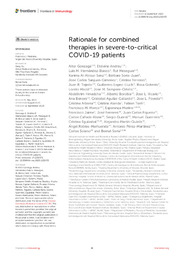Título :
Rationale for combined therapies in severe-to-critical COVID-19 patients |
Autor :
Gonzaga, Aitor
Andreu, Etelvina 
Hernandez Blasco, Luis M. 
Meseguer, Rut
Al-Akioui-Sanz, Karima
Soria-Juan, Bárbara
Sanjuan-Gimenez, Jose Carlos 
Ferreras, Cristina 
Tejedo, Juan R. 
López-Lluch, Guillermo 
Goterris, Rosa
Maciá, Loreto
Sempere-Ortells, Jose M
Hmadcha, Abdelkrim 
Borobia, Alberto  |
Editor :
Frontiers Research Foundation |
Departamento:
Departamentos de la UMH::Física Aplicada
Departamentos de la UMH::Medicina Clínica |
Fecha de publicación:
2023-09-11 |
URI :
https://hdl.handle.net/11000/34837 |
Resumen :
An unprecedented global social and economic impact as well as a significant
number of fatalities have been brought on by the coronavirus disease 2019
(COVID-19), produced by the severe acute respiratory syndrome coronavirus 2
(SARS-CoV-2). Acute SARS-CoV-2 infection can, in certain situations, cause
immunological abnormalities, leading to an anomalous innate and adaptive
immune response. While most patients only experience mild symptoms and
recover without the need for mechanical ventilation, a substantial percentage of
those who are affected develop severe respiratory illness, which can be fatal. The
absence of effective therapies when disease progresses to a very severe
condition coupled with the incomplete understanding of COVID-19’s
pathogenesis triggers the need to develop innovative therapeutic approaches
for patients at high risk of mortality. As a result, we investigate the potential
contribution of promising combinatorial cell therapy to prevent death in
critical patients.
|
Palabras clave/Materias:
COVID-19
cytokine storm
immunomodulation
mesenchymal stromal cells
SARSCoV- 2
advanced therapies |
Tipo de documento :
info:eu-repo/semantics/article |
Derechos de acceso:
info:eu-repo/semantics/openAccess
Attribution-NonCommercial-NoDerivatives 4.0 Internacional |
DOI :
10.3389/fimmu.2023.1232472 |
Publicado en:
Front Immunol. 2023 Sep 11:14:1232472. |
Aparece en las colecciones:
Artículos - Física Aplicada
|

 La licencia se describe como: Atribución-NonComercial-NoDerivada 4.0 Internacional.
La licencia se describe como: Atribución-NonComercial-NoDerivada 4.0 Internacional.
.png)